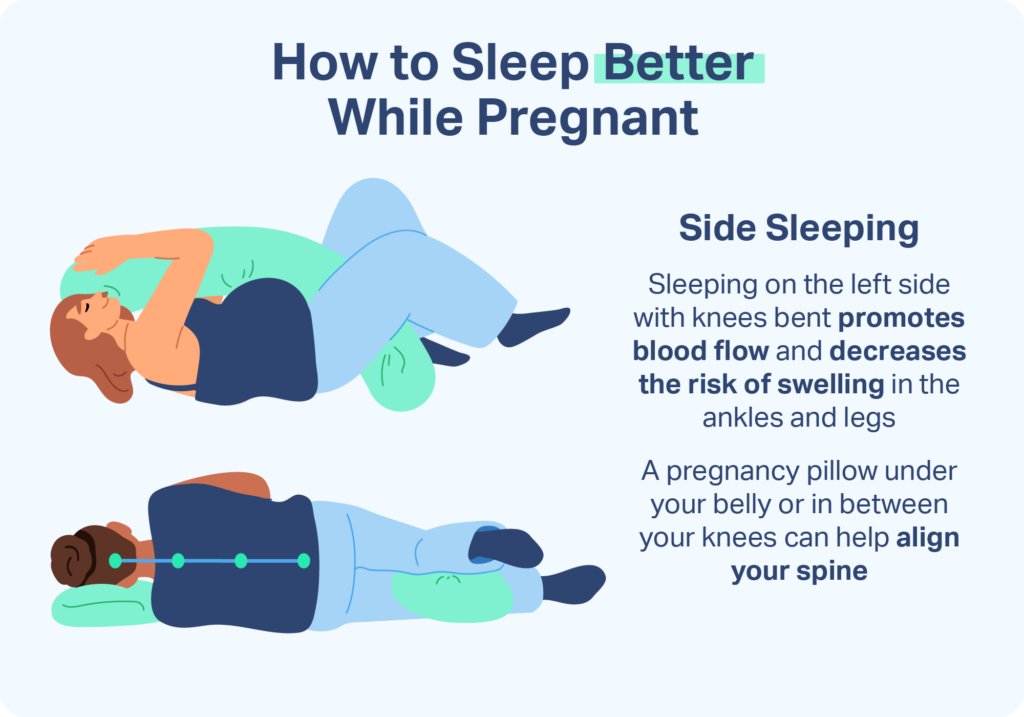When you buy through our links, we may earn a commission. Products or services may be offered by an affiliated entity. Learn more.
Can You Sleep on Your Back While Pregnant?
- During the first trimester, it’s generally safe to sleep on your back, if that’s how you usually sleep.
- Starting around 20 weeks of pregnancy, back sleeping comes with some potential risks for the pregnant person and the fetus.
- Side sleeping is a safer option for pregnant people.
When you’re pregnant, certain habits become less safe for you and your baby. Sleeping on your back is one of those things. To accommodate changes in your body, if you sleep on your back, you’ll need to modify your usual sleeping position around 20 weeks of pregnancy—and sleep that way for the duration of your pregnancy.
Below, we’ll take a closer look at why it’s important to avoid or reduce back sleeping in the later stages of pregnancy, along with tips on finding the safest sleeping position. We’ll also talk about simple strategies pregnant people can use to feel comfortable in bed to get a much-needed restful night’s sleep.
Can You Sleep on Your Back While Pregnant?
During the first trimester of pregnancy, it’s generally safe to sleep on your back, if that’s your preferred sleeping position. But as your fetus grows and your uterus expands, most health care providers advise against back sleeping. That’s because lying flat on your back may increase your risk for certain complications.
In the second trimester (after 20 weeks), your growing uterus puts significant pressure on the large blood vessels to the uterus, says Sherry Ross, MD, OB-GYN and co-founder of Oneself Intimate Skin Care and author of She-ology. This weight can reduce blow flow to the fetus and to the heart, potentially causing low blood pressure and symptoms like dizziness, nausea, and fainting, she says.
The reduced blood flow to the placenta may also put stress on the fetus, potentially affecting fetal growth and contributing to a lower birth weight . Some research has even linked back sleeping in the third trimester to an increased risk of stillbirth .
Are You Getting Enough Deep Sleep?
A variety of issues can cause degrade your sleep quality. Answer three questions to understand if it’s a concern you should worry about.
Why Can’t You Sleep on Your Back While Pregnant?
Unfortunately, back sleeping isn’t considered safe for you or your fetus after 20 weeks of pregnancy. While you shouldn’t panic if you wake up and find yourself accidentally lying flat on your back, it’s best to do what you can to avoid it. This reason has to do with the weight of your growing uterus.
As your uterus gets bigger, it can compress major blood vessels like the inferior vena cava and aorta when you’re lying down . This makes it harder for blood to reach your heart and the fetus, which can potentially cause symptoms like difficulty breathing, dizziness, and fainting, Dr. Ross says. The decreased blood circulation to your fetus can also lead to serious complications, including reduced birth size and stillbirth.
Sleeping on your back in later pregnancy can contribute to other health issues. For example, back sleeping can cause undue stress on the back muscles and spine, leading to back pain, a common complaint among pregnant people. It may also increase your risk for sleep apnea .
When Should You Stop Sleeping on Your Back When Pregnant?
Most experts agree it’s best to avoid sleeping on your back after 20 weeks. After that, the weight of your uterus begins to put pressure on the inferior vena cava, disrupting blood flow to the heart and fetus.
However, another study suggests you may be able to sleep safely in a supine position until your third trimester. Researchers found that sleeping on your back (or right side) though 30 weeks of pregnancy didn’t raise the risk of stillbirth, low birth weight, or high blood pressure .
That said, more studies need to be done to confirm the safety of back sleeping through 30 weeks of pregnancy. In the meantime, it’s always best to consult with your medical provider and follow the current guidelines for safe sleep while pregnant.
What’s the Best Sleeping Position During Pregnancy?
During the first three months of pregnancy, you can sleep in any way that feels most comfortable. But in the second and third trimesters, most health care providers agree that side sleeping is the safest position for you and your fetus, Dr. Ross says. That’s because it promotes circulation.
When you sleep on your side, your inferior vena cava can carry blood back to your heart without a problem . This means you and your fetus get the essential blood, oxygen, and nutrients you need. Additionally, side sleeping can help decrease swelling, varicose veins, and hemorrhoids .
Still, you might wonder: Is sleeping on one side better than the other? Many experts recommend pregnant people sleep on their left side. This position optimizes blood flow to the heart, fetus, uterus, and kidneys while reducing strain on your liver .
However, some research suggests that falling asleep on your right side is equally safe, with neither side sleeping position being associated with a higher risk of stillbirth . In other words, it may be safe to sleep on whichever side feels more comfortable. Ultimately, the goal is to get a good night’s rest.
If you’re unsure about whether to sleep on your right or left side, speak with your health provider to discuss the potential benefits and risks to help you make the best decision for you.

How Can I Get Better Sleep While Pregnant?
“Getting a good night’s sleep must be a priority during pregnancy,” Dr. Ross says. But if you’re a habitual back (or stomach) sleeper, you might wonder how to make the shift to side sleeping. Rest assured, a few simple tweaks can make a big difference to set the stage for a restful slumber. Here are her tips for sleeping better during pregnancy.
- Create an ideal sleeping environment. A cool, comfortable bedroom setting that shuts out noise and light” is optimal for getting a peaceful night’s rest.
- Do something that calms you. “Wind down with a cup of decaffeinated tea, a relaxing bath, or a good book,” Dr. Ross says. Also limit electronics and other blue light-emitting devices before bed that can be stimulating and disrupt your sleep.
- Wear comfy, loose pajamas. Breathable fabrics like cotton will help you stay cool and comfy during the night.
- Position pillows between the knees and arms and under the abdomen. This helps properly align and support your entire body, reducing aches and pains while promoting blood flow. You can also invest in full-body pregnancy pillows, which are specially designed to support pregnant people during sleep.
- Try a mattress topper. Certain mattress toppers can provide additional cushioning and support, helping to relieve pressure points and hip pain that may accompany side sleeping.
- Practice relaxation techniques before bed. “Mindfulness, biofeedback, Tai Chi, massage, and prenatal yoga” can all help relax the mind and body, Dr. Ross says.
- Stay active during the day. Aim to exercise for 30 minutes a day to help with sleep at night. Even if that’s just walking. But make sure to do it at least four hours before bedtime.
- Limit caffeine intake. One cup of coffee or caffeinated tea early in the day is considered safe and won’t make you feel wired when it’s time for bed.
- Eat light dinners. Avoiding fatty or fried foods can reduce your chances of an upset stomach or heartburn, which can keep you up at night during pregnancy.
- Focus on eating a colorful, balanced diet. Consuming vitamin rich, nutrient-dense foods can support better sleep.
- Stay well hydrated. Drinking eight to 10 glasses of water a day can help you avoid waking up with issues like dry mouth or muscle cramps. Just limit fluid intake after dinner to avoid middle-of-the-night bathroom trips.
Frequently Asked Questions
What if I wake up on my back during the night?
Even if you have the best intentions of side sleeping, there’s a chance you may shift positions in your sleep and wake up on your back during some point in the night. Try not to overly stress if this happens. Short stints of back sleeping aren’t likely to harm your fetus. Simply roll back on your side.
You can also try a simple trick to prevent it from happening again: Wedge a few pillows behind your lower back. This strategy “will help reduce the chance of a pregnant person ending up on their back,” Dr. Ross says.
However, if you notice any pain, nausea, or breathlessness upon waking on your back, it’s always best to discuss these with your health care practitioner.
Can I sleep on my back while pregnant if propped up?
If you simply can’t get comfortable sleeping on your side, lying in an elevated position can be an alternative. Try sleeping with a pillow wedge, propping yourself up with some throw pillows, or raising the head of your mattress. Some people are even comfortable sleeping in a reclining chair toward the end of pregnancy.
Whatever way you choose, it’s still “best to wedge a small pillow behind the mid to lower back,” Dr. Ross says. This ensures that the weight of your enlarged uterus isn’t compressing major blood vessels and cutting off blood supply to the heart.
Sleeping on an incline can also help alleviate common pregnancy complaints like heartburn and acid reflux that tend to worsen at night.
What will happen if you lay on your stomach while pregnant?
During the first trimester, sleeping on your stomach is fine if that’s you prefer, according to Dr. Ross. But as your abdomen expands in the second trimester, sleeping face down may not be physically possible or comfortable. Your breasts, which may grow larger and tender, may also add to the discomfort in this prone sleeping position.
Additionally, stomach sleeping during the later stages of pregnancy may come with possible risks, similar to back sleeping. For example, it may potentially increase pressure on your internal organs and disrupt blood flow.
If you have to sleep on your stomach, try using a donut-shaped pillow. By supporting your abdomen and hips, it can help reduce compression on the inferior vena cava.

Still have questions? Ask our community!
Join our Sleep Care Community — a trusted hub of sleep health professionals, product specialists, and people just like you. Whether you need expert sleep advice for your insomnia or you’re searching for the perfect mattress, we’ve got you covered. Get personalized guidance from the experts who know sleep best.
References
6 Sources
-
Anderson, N. H., Gordon, A., Li, M., Cronin, R. S., Thompson, J., Raynes-Greenow, C. H., Heazell, A., Stacey, T., Culling, V. M., Wilson, J., Askie, L. M., Mitchell, E. A., & McCowan, L. (2019). Association of supine going-to-sleep position in late pregnancy with reduced birth weight: A secondary analysis of an individual participant data meta-analysis. JAMA Network Open, 2(10), e1912614.
https://pubmed.ncbi.nlm.nih.gov/31577362/ -
Cronin, R. S., Li, M., Thompson, J., Gordon, A., Raynes-Greenow, C. H., Heazell, A., Stacey, T., Culling, V. M., Bowring, V., Anderson, N. H., O’Brien, L. M., Mitchell, E. A., Askie, L. M., & McCowan, L. (2019). An individual participant data meta-analysis of maternal going-to-sleep position, interactions with fetal vulnerability, and the risk of late stillbirth. EClinicalMedicine, 10, 49–57.
https://pubmed.ncbi.nlm.nih.gov/31193832/ -
Liu, L., Su, G., Wang, S., & Zhu, B. (2019). The prevalence of obstructive sleep apnea and its association with pregnancy-related health outcomes: a systematic review and meta-analysis. Sleep & breathing = Schlaf & Atmung, 23(2), 399–412.
https://link.springer.com/article/10.1007/s11325-018-1714-7 -
Silver, R. M., Hunter, S., Reddy, U. M., Facco, F., Gibbins, K. J., Grobman, W. A., Mercer, B. M., Haas, D. M., Simhan, H. N., Parry, S., Wapner, R. J., Louis, J., Chung, J. M., Pien, G., Schubert, F. P., Saade, G. R., Zee, P., Redline, S., Parker, C. B., & Nulliparous Pregnancy Outcomes Study: Monitoring Mothers-to-Be (NuMoM2b) Study (2019). Prospective Evaluation of Maternal Sleep Position Through 30 Weeks of Gestation and Adverse Pregnancy Outcomes. Obstetrics and gynecology, 134(4), 667–676.
https://pubmed.ncbi.nlm.nih.gov/31503146/ -
A.D.A.M. Medical Encyclopedia. (2020, June 2). Problems sleeping during pregnancy. MedlinePlus.
https://medlineplus.gov/ency/patientinstructions/000559.htm -
Rossi, A., Cornette, J., Johnson, M. R., Karamermer, Y., Springeling, T., Opic, P., Moelker, A., Krestin, G. P., Steegers, E., Roos-Hesselink, J., & van Geuns, R. J. (2011). Quantitative cardiovascular magnetic resonance in pregnant women: Cross-sectional analysis of physiological parameters throughout pregnancy and the impact of the supine position. Journal of Cardiovascular Magnetic Resonance, 13(1), 31.
https://pubmed.ncbi.nlm.nih.gov/21708015/












